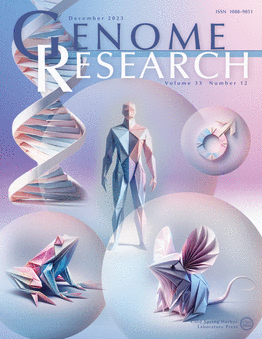Unraveling undiagnosed rare disease cases by HiFi long-read genome sequencing
IF 6.2
2区 生物学
Q1 BIOCHEMISTRY & MOLECULAR BIOLOGY
引用次数: 0
Abstract
Solve-RD is a pan-European rare disease (RD) research program that aims to identify disease-causing genetic variants in previously undiagnosed RD families. We utilized 10-fold coverage HiFi long-read sequencing (LRS) for detecting causative structural variants (SVs), single-nucleotide variants (SNVs), insertion-deletions (indels), and short tandem repeat (STR) expansions in previously studied RD families without a clear molecular diagnosis. Our cohort includes 293 individuals from 114 genetically undiagnosed RD families selected by European Reference Network (ERN) experts. Of these, 21 families were affected by so-called “unsolvable” syndromes for which genetic causes remain unknown and for which prior testing was not a prerequisite. The remaining 93 families had at least one individual affected by a rare neurological, neuromuscular, or epilepsy disorder without a genetic diagnosis despite extensive prior testing. Clinical interpretation and orthogonal validation of variants in known disease genes yielded 12 novel genetic diagnoses due to de novo and rare inherited SNVs, indels, SVs, and STR expansions. In an additional five families, we identified a candidate disease-causing variant, including an MCF2/FGF13 fusion and a PSMA3 deletion. However, no common genetic cause was identified in any of the “unsolvable” syndromes. Taken together, we found (likely) disease-causing genetic variants in 11.8% of previously unsolved families and additional candidate disease-causing SVs in another 5.4% of these families. In conclusion, our results demonstrate the potential added value of HiFi long-read genome sequencing in undiagnosed rare diseases.求助全文
约1分钟内获得全文
求助全文
来源期刊

Genome research
生物-生化与分子生物学
CiteScore
12.40
自引率
1.40%
发文量
140
审稿时长
6 months
期刊介绍:
Launched in 1995, Genome Research is an international, continuously published, peer-reviewed journal that focuses on research that provides novel insights into the genome biology of all organisms, including advances in genomic medicine.
Among the topics considered by the journal are genome structure and function, comparative genomics, molecular evolution, genome-scale quantitative and population genetics, proteomics, epigenomics, and systems biology. The journal also features exciting gene discoveries and reports of cutting-edge computational biology and high-throughput methodologies.
New data in these areas are published as research papers, or methods and resource reports that provide novel information on technologies or tools that will be of interest to a broad readership. Complete data sets are presented electronically on the journal''s web site where appropriate. The journal also provides Reviews, Perspectives, and Insight/Outlook articles, which present commentary on the latest advances published both here and elsewhere, placing such progress in its broader biological context.
 求助内容:
求助内容: 应助结果提醒方式:
应助结果提醒方式:


